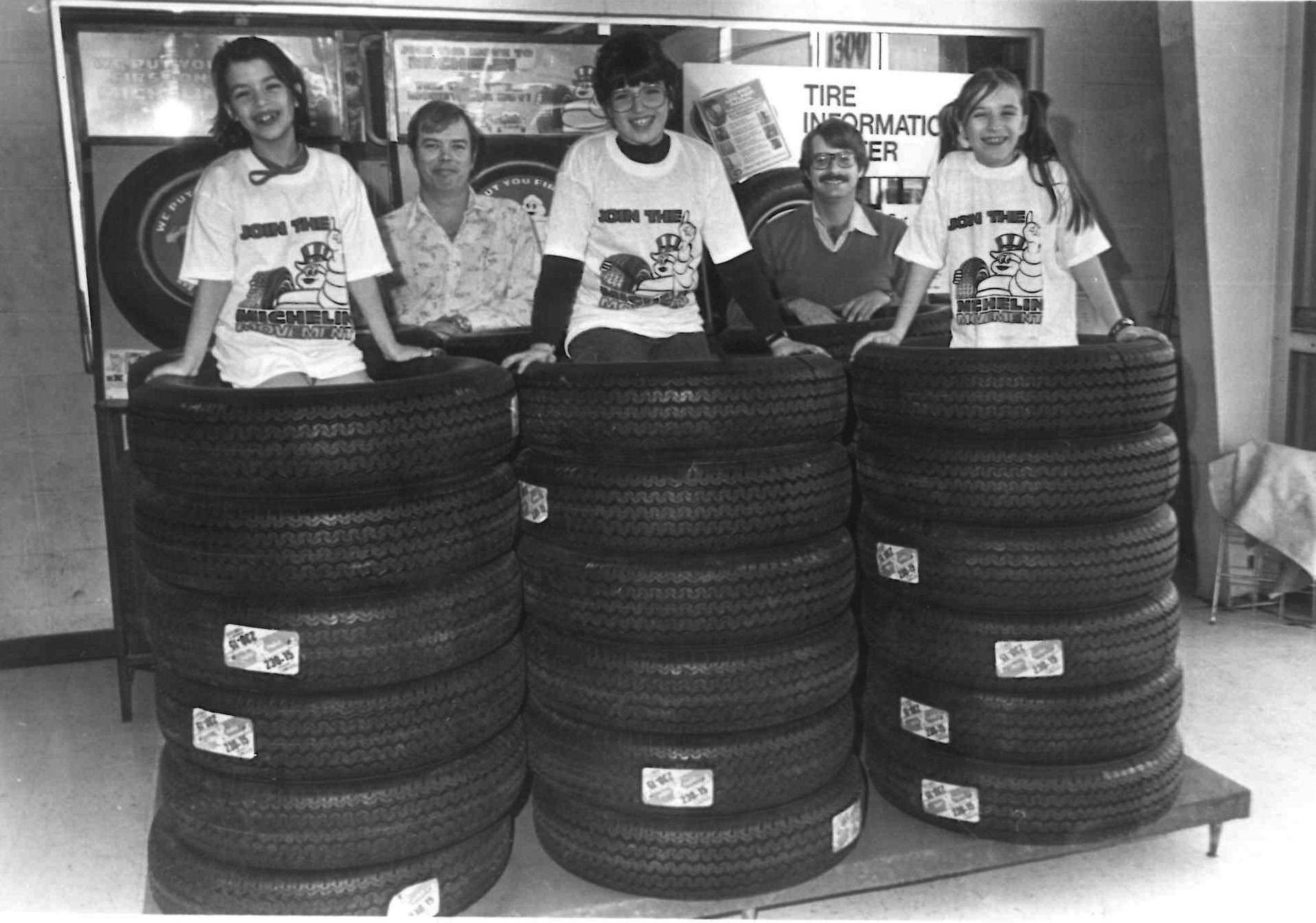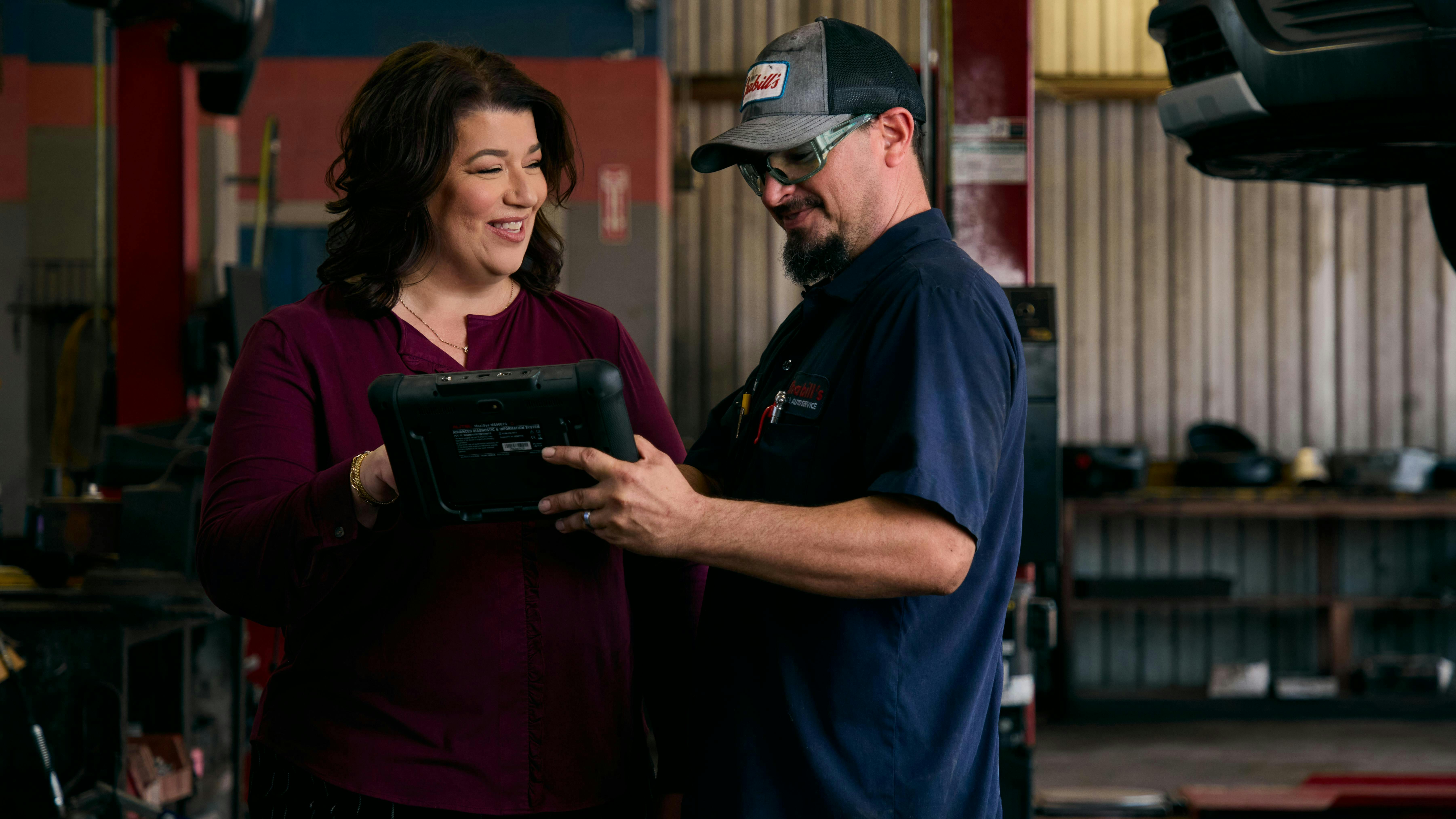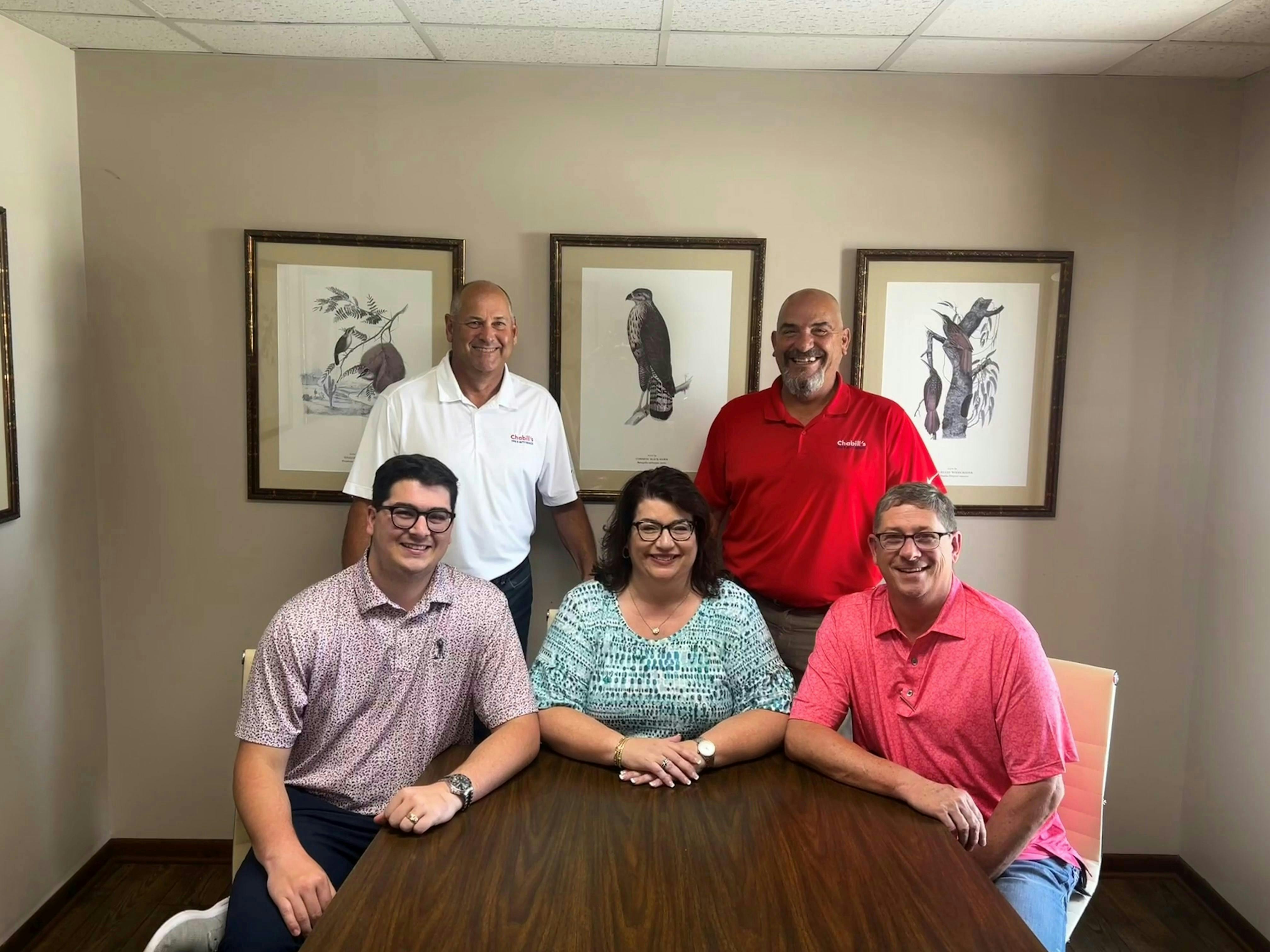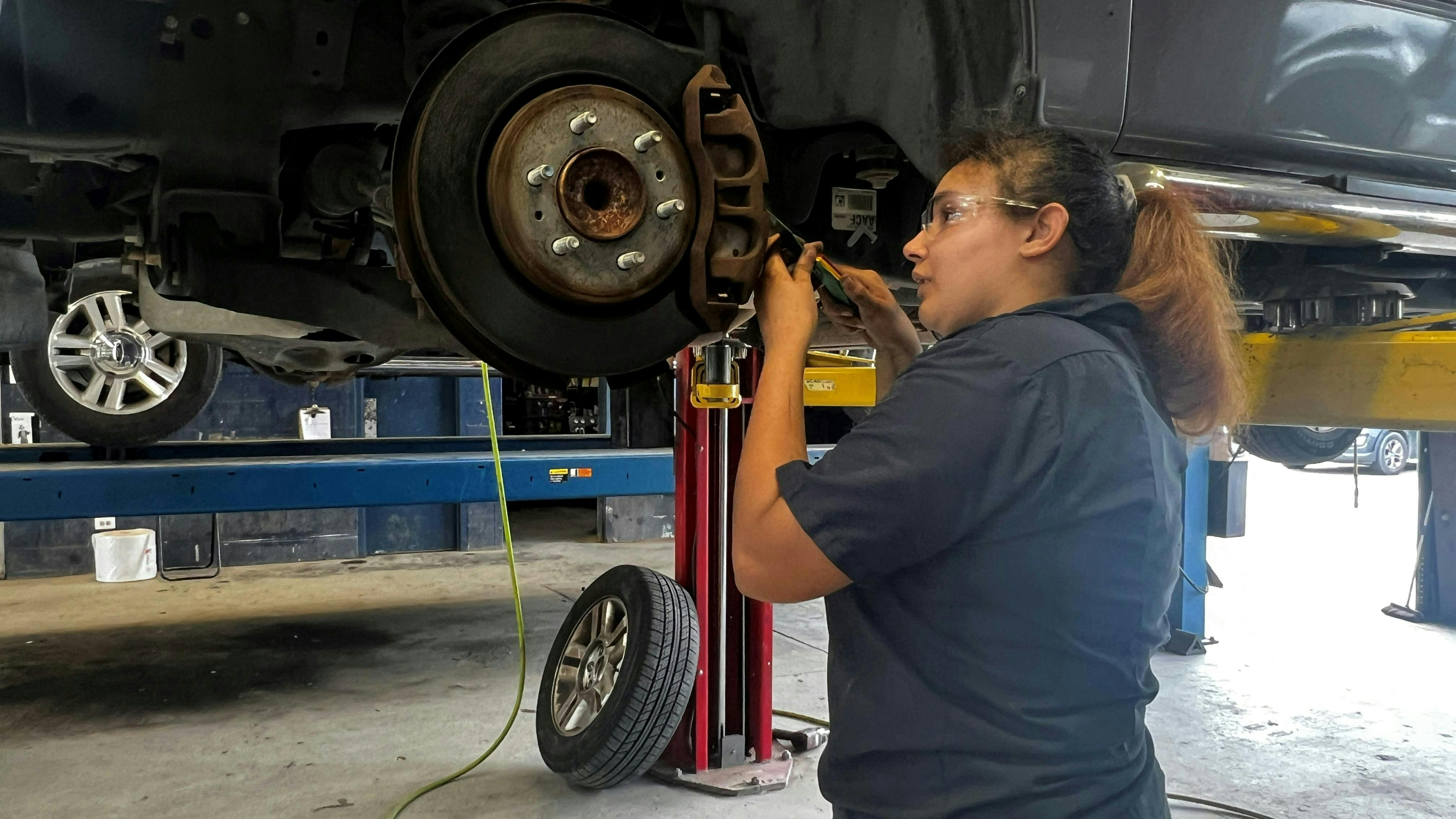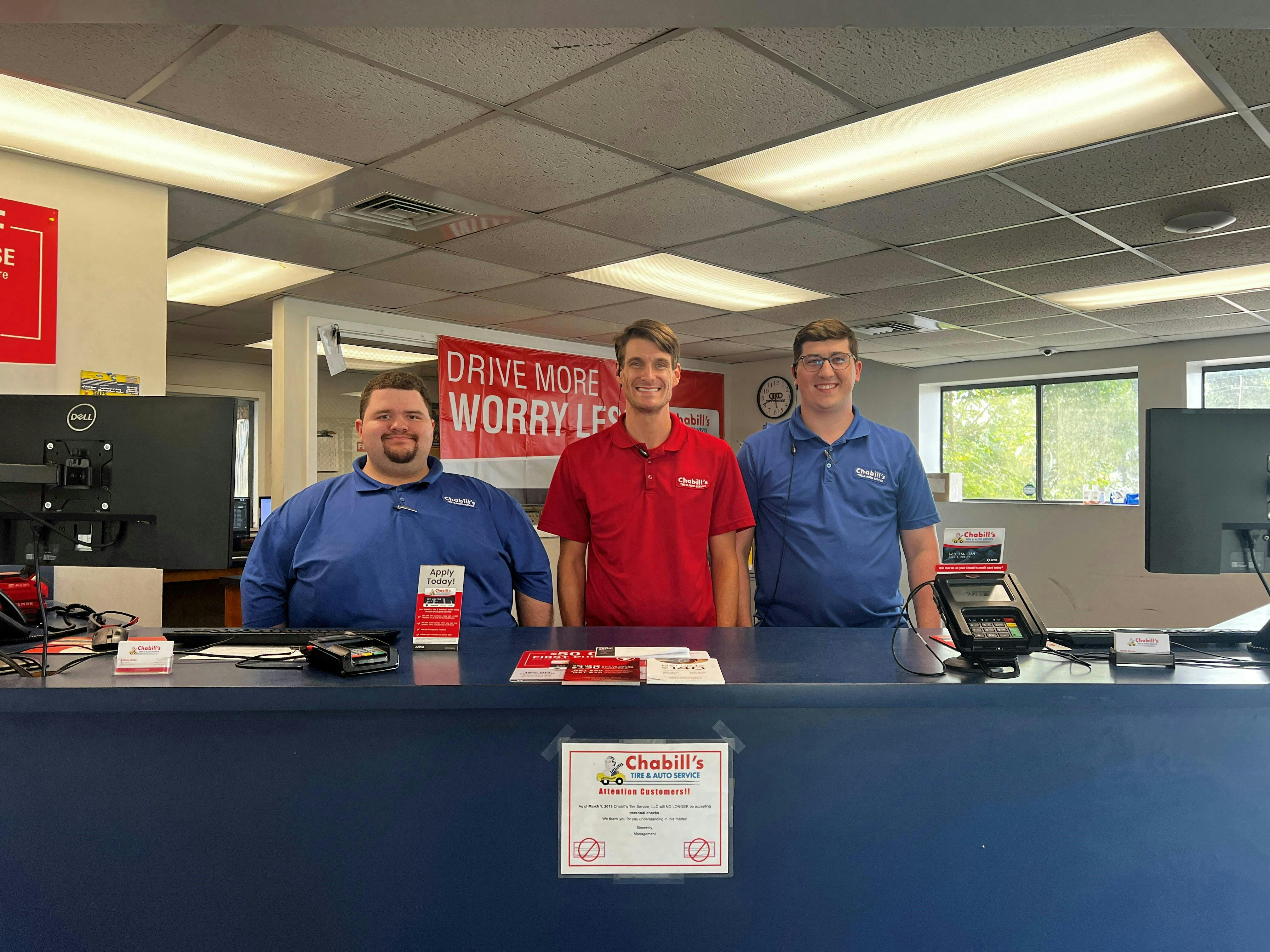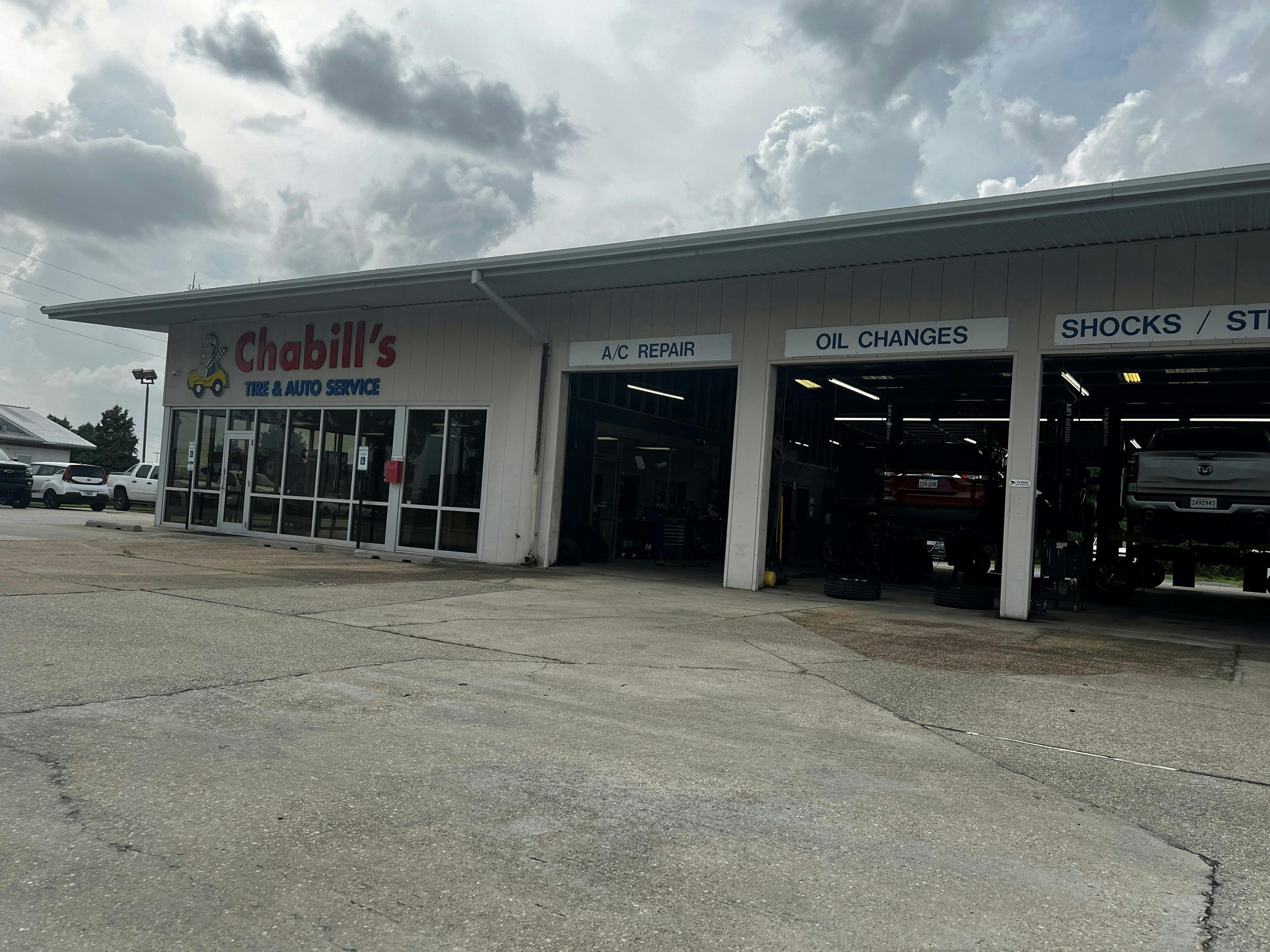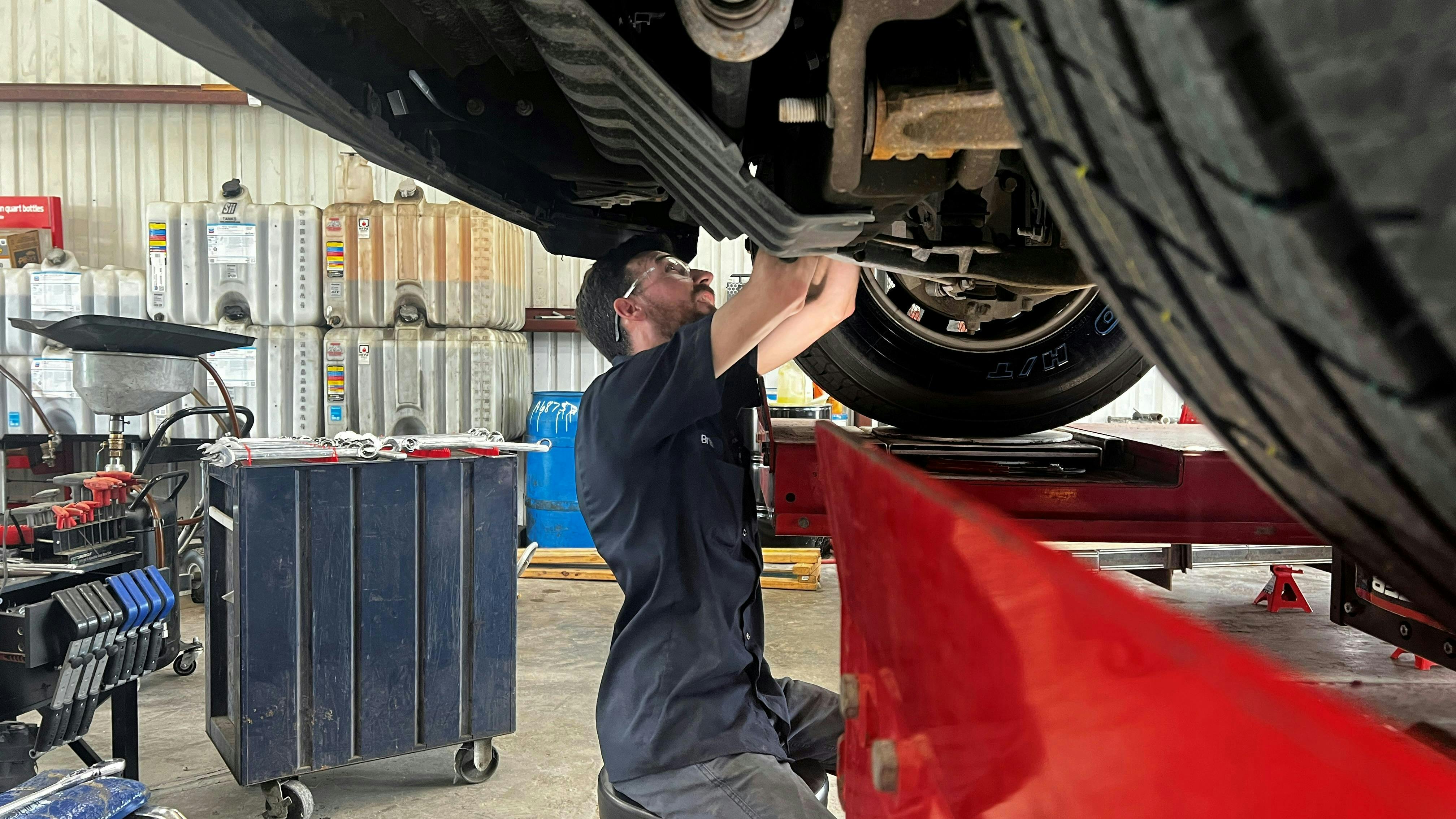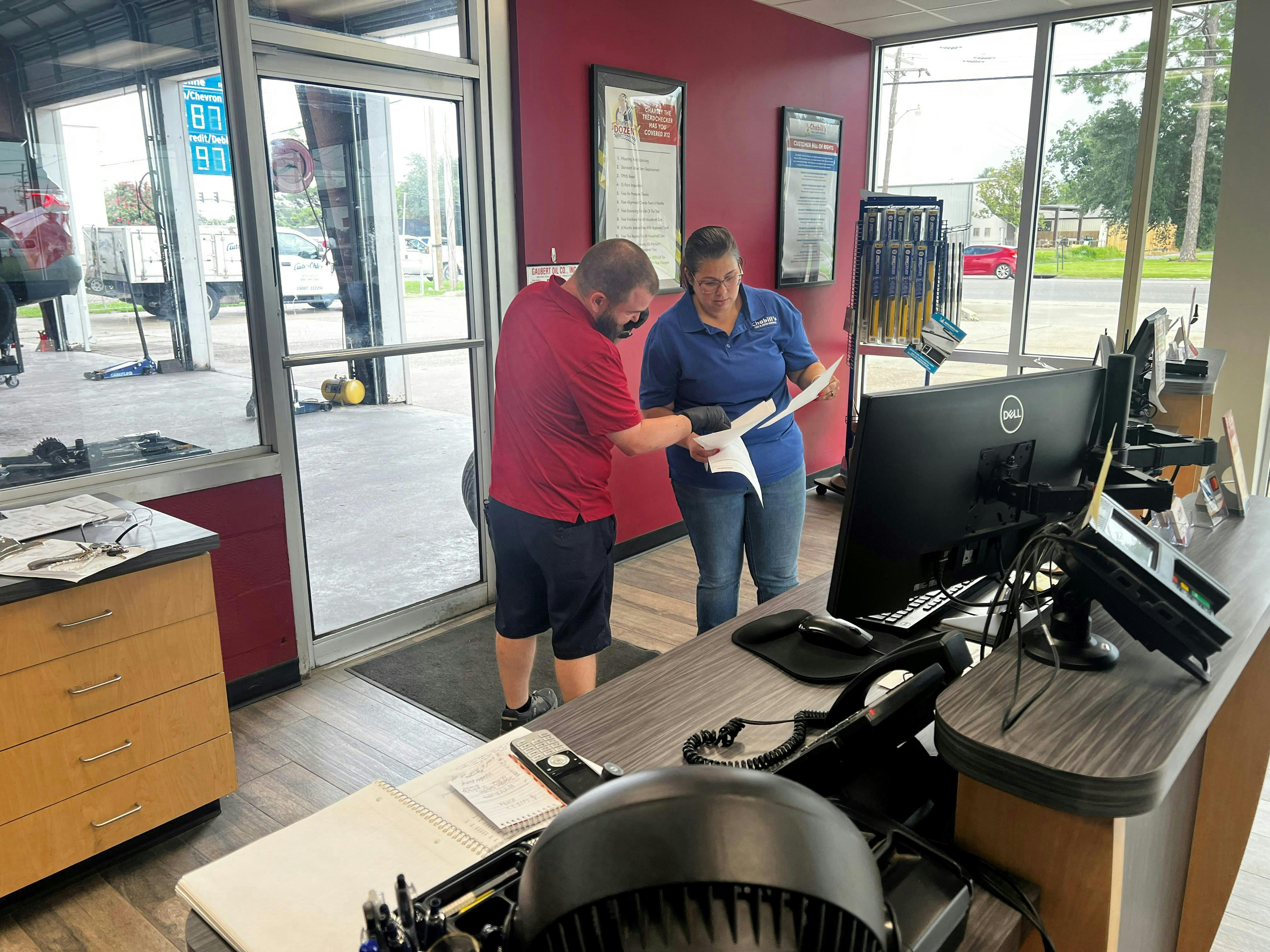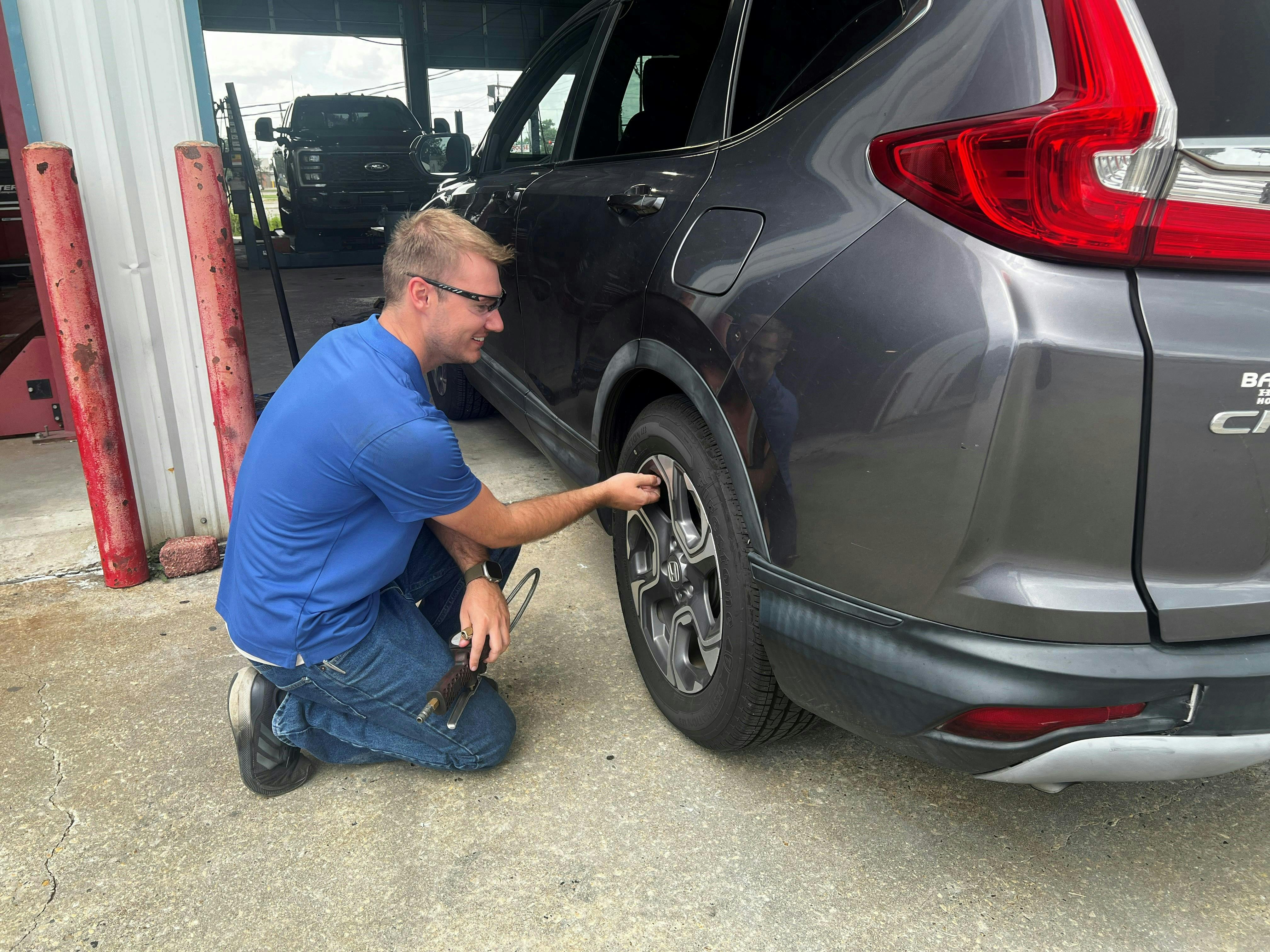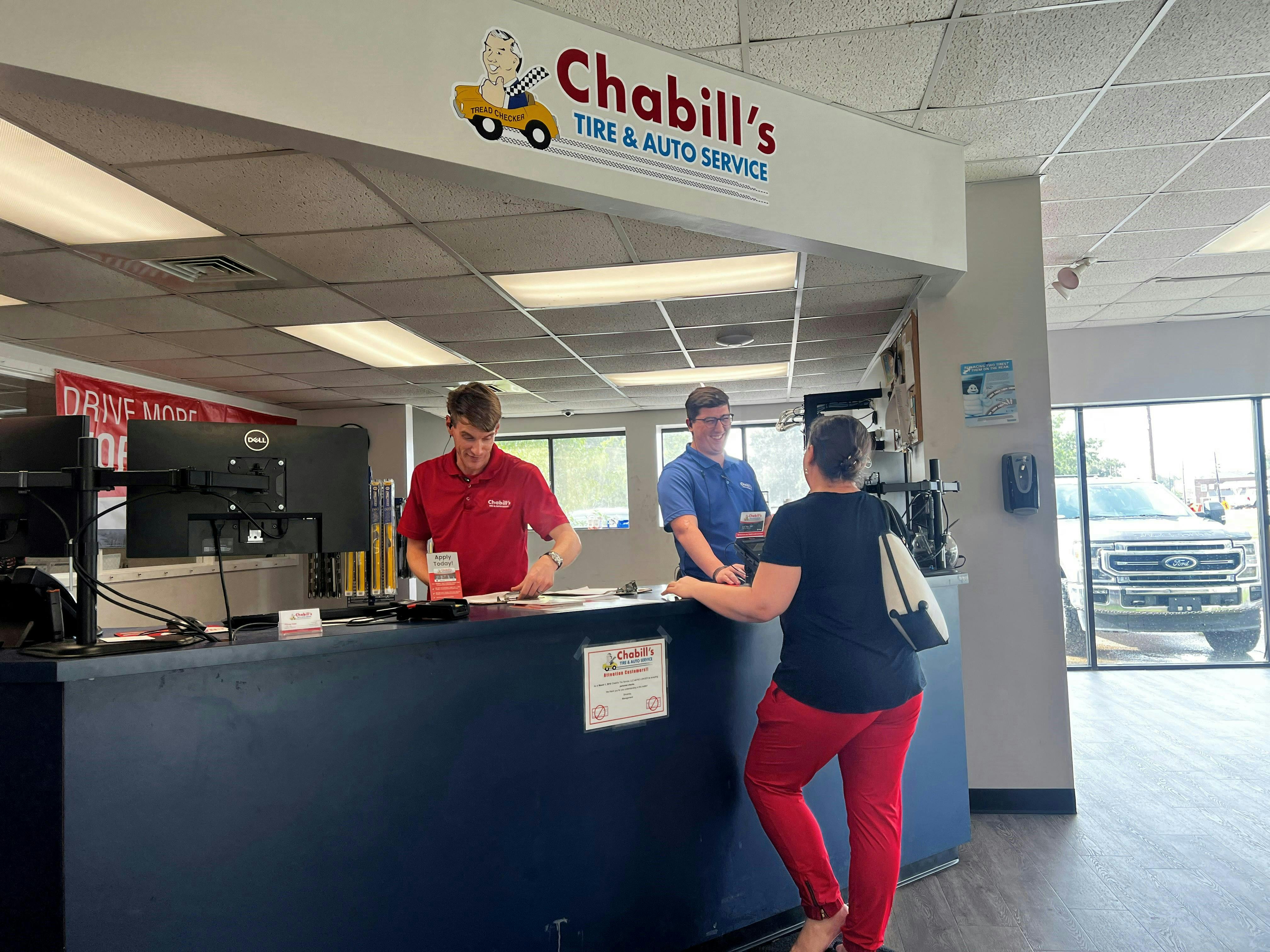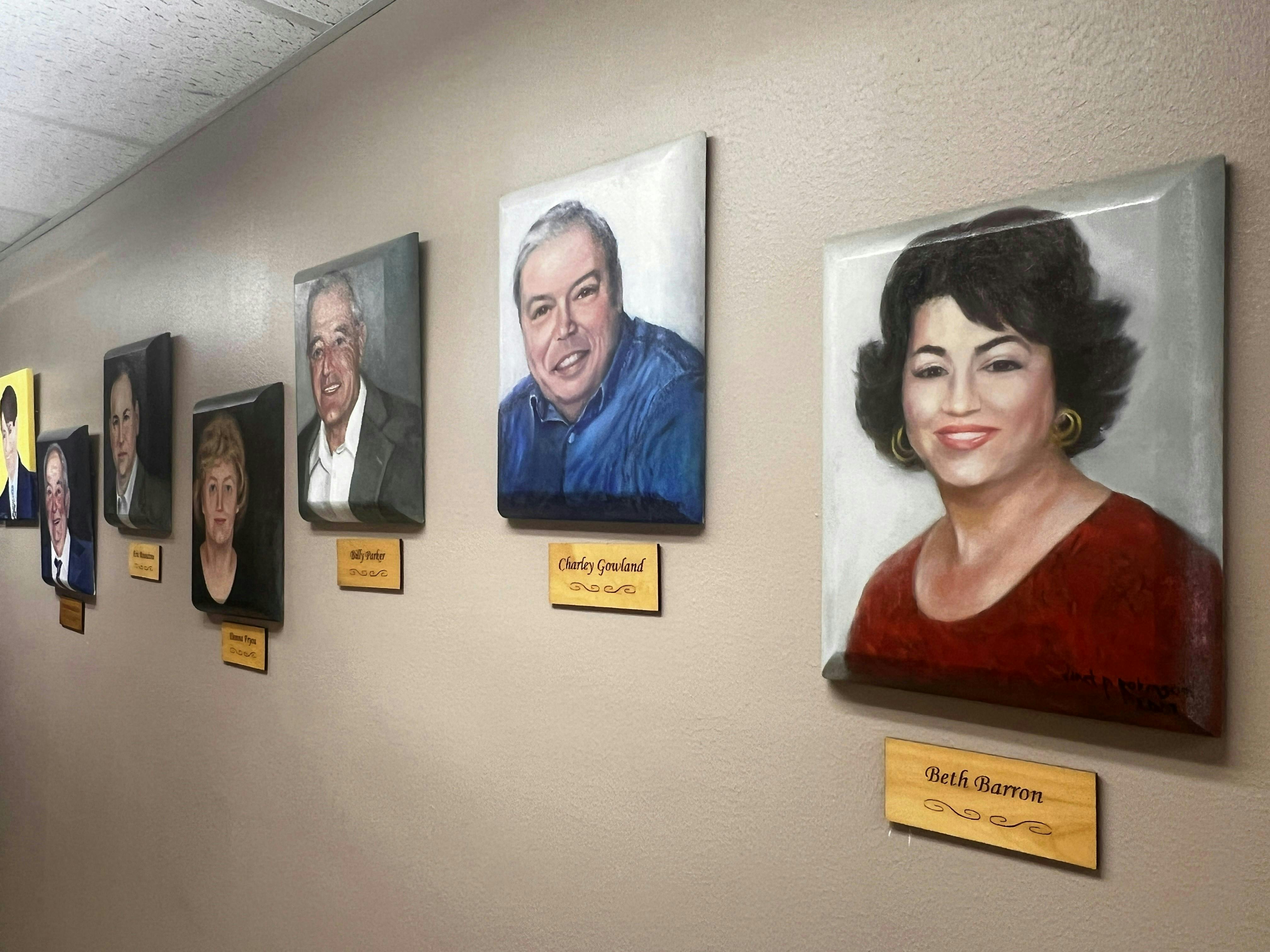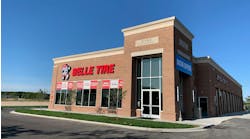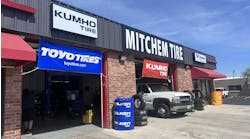Beth Barron’s family entered the tire business before she was born. Yet, it didn’t seem she was destined to become a tire dealer.
She studied political science in college, thought about law school and briefly considered a career in real estate. As she sorted out her future, she decided to bide her time by going to work for her father at Chabill’s Tire & Auto Service.
More than 30 years later, Barron is still there, steering the tire dealership — which has 18 stores in Southern Louisiana — as its CEO. Her team describes her as a driven, competent leader with a vision for the future. She is focused on helping her team shine and provide world-class customer service — and doing so profitably.
She’s a rare female tire dealership owner and she’s also Modern Tire Dealer’s 2024 Tire Dealer of the Year.
A loan and a dream
Barron is the second oldest of four children and like so many other second-generation tire dealers, she grew up in and alongside her family’s business. Her earliest Chabill’s Tire memory isn’t of a store or a specific event, but of a childhood weekend chore: cleaning her dad’s office.
Charley Gowland was an accountant by trade and one day in the 1960s he was doing the books inside the Western Auto store in Franklin, La., when a salesman for the BF Goodrich Co. walked in the door. Gowland asked the salesman why tiremaker didn’t sell its tires 20 miles down the road in his hometown of Morgan City.
As the story goes, the salesman said, “Nobody wants to sell BFGoodrich in Morgan City. Do you want to sell BFGoodrich tires in Morgan City?”
Gowland replied he didn’t know a thing about the tire business, but he took the man’s business card.
Personality Profile: Get to Know Beth Barron
Barron says, “My dad always wanted to run his own business. He knew that about himself. He just didn’t know what kind of business. He knew nothing about cars (and) never worked on his own car. But I guess he saw this opportunity. And so he had to go out and find a partner who knew something about cars.”
Enter Billy Parker, someone Gowland knew only as an acquaintance. He told Parker what he was considering and asked if Parker wanted to be his partner. They both invested $2,000 — though Gowland had to borrow his share from his father-in-law, who also let them use a small building he owned to get started.
The two men combined their first names to create their new business’ name and in September 1968, Chabill’s Tire and Auto Service was born.
“He came from a very poor background,” Barron says of her father, “so I think his idea was ‘This is how I’m going to make my life. This is how I’m going to be a success.’”
See the full article, with more photos, in MTD's September digital edition.
When customers came in, Parker inspected their vehicles and he told Gowland what was needed. Then it was Gowland’s job to sell those parts and services to the customer. Over time, he learned about automobiles and parts and repairs. Just two years later, the men moved Chabill’s Tire to a larger store in Morgan City. That location, known as “Store No. 1,” remains in operation.
“But my dad was not interested in being a salesman all his life,” says Barron. “He knew that from the get-go. He wanted to own and run a business.”
Gowland wanted to expand, and in 1972, a second Chabill’s Tire store opened in nearby Houma. Store three followed in 1975 and then came the warehouse and office in 1980 in Morgan City. Parker remained a partner in the business until Gowland bought him out in 2012.
By the time Gowland died in 2019, Chabill’s Tire & Auto Service had grown to 18 locations with more than 130 employees across southern Louisiana.
‘The bottom dropped out’
Despite the dealership’s growth, there were rough years, The business almost didn’t survive the 1980s. Back then, Morgan City’s economy was tightly tied to the oil industry. Large oil field service companies, including Halliburton Co. and Schlumberger (SLB), had offices and vehicles in Morgan City. There were fabricators and boat companies — businesses of all sorts that supported the off-shore oil business. Collectively, they drove the local economy, so when oil prices dropped dramatically and oil drilling stopped abruptly, the businesses that had grown to touch and reinforce the local industry faltered, too.
“So many people were unemployed,” says Barron. “There was no money. Businesses were all going belly up, so the accounts receivable we were holding, we couldn’t call in.
“I was a kid in that household when he was going through that stress,” she says of her dad. “I think that changed him. Before the ‘80s (my parents) would go off and do this vacation or they would go golfing and do things with their friends. Dad kind of felt the business was in a place where it could run itself.”
The oil bust of the 1980s humbled Gowland. “The bottom dropped out and things got really bad, really fast,” says Barron.
Gowland dove back in head-first. He needed to cut payroll in the office. “My mom went to work for him for free for a lot of years. My mom would do clerical work, national account work, payables. She was doing all that to help keep the business afloat through the ‘80s.”
Peggy Gowland recently told her daughter that there was a banker who was also a family friend and held the business’ bank notes.
“And basically, he didn’t call them in,” says Barron. “(The banker) said ‘Charley, I believe you’re going to make it through this. We’re going to make it through with you.’”
That was an enormous gift, but it didn’t stop all of the bleeding. Other businesses crumbled, including many who were Chabill’s Tire’s customers. Some of the Gowlands’ friends lost their livelihoods and were unable to pay what they owed.
“It was a hard, hard time and he made it through,” says Barron.
Finding her way
When Barron graduated from college in 1992, she returned home from Northwestern State University in Natchitoches, La., with a degree in political science. She thought she might become a lawyer. “Thank God I didn’t do that,” she says.
But she was also newly engaged to another Morgan City native, Carey Barron, who had moved home to work for his father’s local business. She didn’t know what her long-term career plan was, so she went to work for Chabill’s Tire.
She and Carey got married in 1993 and then started their family and along the way Barron worked in different departments in the dealership’s corporate office. “I did payables for a while. I did every job in this office. I was a receptionist. I did payroll. I did collection calls. I never liked that job.”
One of her bigger assignments came when she took over advertising responsibilities. As a young mother, she quickly discovered she wasn’t destined to be a stay-at-home mom, so once her four children were all in school, she decided to return to the family business full-time.
“That would have been probably 20 years ago. I started taking more of an active interest (in the business). My dad was great. He was fine with me coming and going (when her children were young.) He let me go through all of that and gave me a place to land.”
But Barron said she and her father never had a formal conversation about what her long-term role at the company would be. Gowland put his daughter to work, but he maintained control. With his background in accounting, he was fixated on the numbers. He reviewed every single sales ticket — for years — and marked them up with his trademarked red pen. (Carey Barron says the company bought red pens in bulk, even though only one person used them.)
Barron says her father would call store managers and demand to know why they didn’t perform an alignment on a particular car. “He just felt like we had to squeeze every dollar out of every ticket,” because he did not want to relive those dark days of the 1980s oil bust.
The oil crisis made Gowland feel vulnerable. He didn’t want to get caught unprepared ever again. “(It) forced him to pay attention and get rid of all the fluff and get down to the nitty-gritty of every day, trying to make a profit. I think he never got out of that mindset. He kicked himself for letting it go. He was going to survive and he did, and he flourished after that. But he would not let go of that grip he had.”
She has great respect for the determination and grit required of both of her parents to survive that difficult period. And Barron has recognized that Chabill’s Tire hasn’t faced anything like that in the decades she’s worked in the business, let alone in the five years since she’s taken over as CEO.
It wasn’t until 2013 — at the earliest — that Barron says her father started to give her more authority. She managed more top-level duties and he listened to her advice. She and other members of the dealership’s executive team tried to convince him he didn’t need to call the stores and question every sales ticket and if he did call, it didn’t need to be so confrontational.
Since she took over as CEO in January 2019, Barron has brought a new executive approach. “Generally I’m very positive,” she says, preferring to label herself as head company cheerleader, rather than chief executive.
Benefits from one change
Barron is not afraid to make changes. Chabill’s Tire & Auto Service opened its doors in 1968 due to a partnership with BFGoodrich and as a result, the company’s relationship with Michelin North America Inc., which owns the BFGoodrich brand, has been an important one for decades. And for most of that time, Chabill’s bought direct.
But in 2020, Barron made a change. A new salesperson for National Tire Wholesale (NTW) approached Barron and asked for her business. She wasn’t happy with some changes that had been made to her direct program with Michelin and was open to other options.
“Dad and I had talked about this deal with Michelin and how upset I was and he’s like, ‘You’re going to make the best decision. Whatever decision you need to make or you want to make, you just need to weigh the pros and cons.’”
After six months of negotiations, Chabill’s Tire became a NTW customer “and now that’s the biggest relationship I have in this business. I buy a lot from them.”
It also opened the door to diversifying the dealership’s lineup of tire brands. Around the same time, Barron also negotiated a deal to become a direct customer of Bridgestone Americas Inc.
“It’s not contentious,” she says. “I just don’t want to have one company be able to pull the rug out from under me. Opening up the relationship with NTW (has) grown into so much more. They’re our number one wholesaler.”
Chabill’s Tire also has relationships with Dunlap & Kyle Co. Inc. and TireHub LLC.
“I believe in meeting programs — which my dad was huge on — so I make choices about who I buy from and what we do based on those programs. That’s why, (if) the stores are going to buy from somewhere other than NTW, you’re going to call somebody and tell them why.
“We know they’re not going to have everything all the time, but we want to know you’ve gone through the paces” of trying to secure tires through the preferred distributor. “I want to maximize my best program.
“We sell about 55,000 (passenger and light truck) tires a year. You’ve got to be really careful about where you’re buying from because that can get split up and then you end up with no back-end money. When you’re a small business and small volume, that back-end money makes a ton of difference.
“Everybody understands that about me,” says Barron. “All my managers understand. And it’s the same thing with the parts relationships. NAPA is our first call. We buy over 75% of our parts from NAPA.”
The relationship with NTW — and the twice-daily deliveries the company provides to Chabill’s Tire & Auto Service stores — has created other opportunities for change.
Chabill’s Tire has two warehouses: one in Morgan City and another in Baton Rouge that’s connected to one of the company’s retail stores in that market. There’s a fleet of trucks and a team of drivers who make deliveries to the company’s 18 stores.
“We still run our own routes two or three times a week but having NTW has taken those vehicles off the road,” says Barron. “We used to run every day — sometimes twice a day.”
Relying on NTW has decreased the need for those company-owned trucks to run as frequently. “I don’t have to invest as much in infrastructure and trucks and people to load and unload things because I do more business with the wholesalers.”
And it’s reduced how much inventory Chabill’s Tire needs to stock. Barron says the dealership’s warehouse inventories are probably half the units they once were.
“We still have tires in our warehouses that we get from NTW just because I don’t always trust them to have my A-plus movers, because they’re not going to have everything all the time. So I do hold A-plus movers in our warehouse just in case.
“We have the Bridgestone/Firestone inventory. We do some truck tire business (and hold inventory of those tires). We’re a member of ITDG (Independent Tire Dealers Group LLC) and so there are some programs — we’re on the RoadX program,” which is an exclusive line for ITDG members from Sailun Tire Americas that offers passenger, light truck and truck tires. “So we’re going to have more stuff in our warehouse than we have had previously.
“But that NTW piece is important. It really changed the way we do business and I think for the better.
“My dad used to say, ‘Don’t buy a tire from a wholesaler, no matter what wholesaler. You sell what we have.’ And that was so much to monitor and try to stay on top of, because we never had everything. And with more SKU proliferation and with more brand proliferation — this is how manufacturers have decided to go to market. They really want to push as much product through those wholesalers as they possibly can.”
Her theory is that tire manufacturers don’t want to service an account like hers, because from their perspective, Chabill’s is a low-volume customer. “They want to sell to people that are going to buy a million tires a year,” she says. “They can’t give the service to an account like Chabill’s. But to NTW, Chabill’s is a huge account. They’re going to do everything they possibly can do to get me the tires that I need.
“It’s been a huge change in the way we go to business, but I think it’s been a profitable change. I think we’re able to get the customer what they want. It doesn’t have to be we sell them what we have. We can sell them anything — anything in NTW’s portfolio (and) anything in TireHub’s portfolio for that matter.
“The manufacturers have made the decision and it makes sense for them to push as much product through those wholesalers as they can, in my opinion.”
Saturday shutdown
For decades, Chabill’s Tire & Auto Service had been open for a half-day on Saturdays. But amid all the chaos of 2020, Barron says she noticed a few things about that Saturday business.
“More complaints came in on Saturday because we worked half crews,” she says. “There were more waiters on Saturday because people were off work” and they added tire and automotive service work to their weekend errands.
She saw two options: open every store for a full day of work on Saturdays and add personnel to fully staff every location for six days a week, or close for a two-day weekend. She called a staff meeting with her 18 store managers.
“I think they all thought I was going to tell them that I was selling the business,” she says. After all, she had only taken over leadership of the business the year prior, shortly before her father died.
She told the managers that the stores would close on Saturdays, but there was a catch. “’You’ve got to make the same amount of money you’re making now. ’You’ve got to make that same amount during five workdays. We’re going to see if we can’t make this thing rock in five days.’”
It was the first executive decision and change she made that she knew her father never would have even considered. But she had reviewed the numbers and considered the options. She was confident it could work.
The Monday through Friday workdays were extended by a half-hour with full staffing scheduled from 8 a.m. to 6 p.m. Barron gave her managers one year — until December 2021 — to hit the mark. If they didn’t, stores would reopen on Saturdays, but for a full day of work.
“It was the right decision,” she says, now four years later, adding that half of her closest friends and peers who own tire dealerships are still open on Saturdays while the rest are no longer open that day.
“Our business is better than it’s ever been. Since COVID, I keep waiting for business to fall off and it never has. They just keep doing more and more and more in those five days a week. They’re doing what I’m asking them to do.
“Our managers have been with us for lots and lots of years, so they understood the call and they answered the call and it was such a huge relief not to have to be worried about Saturday. It’s just wonderful and it’s one of the reasons why I probably will never sell this business because there’s nobody who wants to buy this business that isn’t going to be open on Saturdays. It’s the people who make this business and those people will be unhappy.”
A localized commercial approach
Eric Roundtree has worked at Chabill’s Tire & Auto Service since 1988. He was working for his cousin at a service station — pumping gas and turning wrenches — but his cousin lost the lease, so Roundtree needed to find work.
Chabill’s Tire had just opened a store in Thibodaux and the 27-year-old Roundtree decided to seek a job there. On his application, he noted that he had experience as “a petroleum transfer engineer.” The Thibodaux store manager liked that little bit of creativity and it earned him an interview and ultimately a job.
Roundtree’s career began in the service bay and he eventually became a service manager. “I loved it,” he says. When another store was struggling, Gowland sent Roundtree there to assist and see if he could spot the problem.
It was in plain sight, he says: the manager kept Budweisers under the front counter.
“I had to make that difficult call to Mr. Charley. He was so good about it. ‘Don’t worry about it. I’ll be there this afternoon.’” Gowland came to the store, fired the manager and suddenly Roundtree had a store to manage.
The experienced, older staff didn’t want to listen to the young guy who they felt had ratted out their previous boss, so Roundtree had to start over with an entirely new crew. But over time, the store became a top performer.
“We really turned that store into a money maker,” he says. It was so successful that Gowland tasked Roundtree with finding property for a second store in Houma.
Roundtree continued to move up the ranks, from store manager to district manager and then into the company’s commercial business. Today he is the vice president of commercial sales at Chabill’s Tire and he occupies Gowland’s former office. Both men have been inducted into the Louisiana Tire & Automotive Service Association's Hall of Fame.
He says one thing has been drilled into him in his decades with Chabill’s Tire. “The main thing is taking care of the customer. Everything else will work out.
“And that’s what Mr. Charley was great about. He would call me in the afternoon sometimes to go over some of the decisions I made — on pricing, or ‘Why did you do this? Why did you do that?’
“At the time, I didn’t really know why he was doing that, but he was making me learn the business. You’ve got to also make money on the back end. You can’t give everything away. He really brought me a lot of good with that.”
Barron says commercial customers have been an important part of the Chabill’s Tire’s business since day one. She relies on Roundtree to oversee that work, which adds up to 12% of the company’s overall sales.
Chabill’s Tire operates four service trucks and Roundtree says the bulk of that commercial business is tied to the region’s oil and gas industry.
“It’s mostly oil field companies, pipeyard or shipyard — everything is around oil and gas,” he says.
Port Fourchon is a critical driver for business.“I would have to probably lay off one or two guys if it wasn’t for that port,” says Roundtree.
Chabill’s Tire’s commercial strategy doesn’t include around-the-clock emergency roadside service for the typical over-the-road truck fleet customer. But Roundtree says forklift tire service is a big piece of the dealership’s commercial pie.
“We do a lot of forklifts. We do solid rubber tires. We go on site and do them, which is a good money producer for us. Everybody around here has a forklift in their warehouse and I’ve got good relationships with the forklift dealers and some of the rental companies.”
Roundtree is often in a truck handling a service call himself, especially recently as the company is searching to fill an open spot on its commercial roster. In the summertime heat, it’s an especially grueling job. In early-August, daytime temperatures in southern Louisiana reached the mid-90s and with the humidity, daily heat warnings were around 115 degrees.
Service trucks are outfitted with water and coolers “and we instruct them to take breaks — to shut the job down, go sit in your truck, start it up, cool off — whatever you’ve got to do.”
He and Tony Braud, an outside salesperson, also join the crew members on service calls. “I wouldn’t ask them to do anything I wouldn’t do,” says Roundtree.
Chabill’s Tire funnels the bulk of its commercial tire service into three stores — Thibodaux, Matthews and the Houma store on Grand Caillou Road. Some commercial work is also performed inside the dealership’s Morgan City warehouse.
Braud says the company’s service trucks work with commercial customers within 20 miles of each of those locations. He and Roundtree arrange for what work is done where and they coordinate with each store manager to ensure the tires are ordered and the technicians are available to complete those tickets.
Barron says the commercial business is a nice complement to the retail side of Chabill’s Tire, but she’s not looking to expand the company’s overall commercial business. “We have a pretty nice footprint and book of business in this area. But generally, we’re very localized.”
There’s so much competition for the traditional truck road service calls, whether it’s from Columbia, Miss.-based Southern Tire Mart LLC or the likes of Goodyear Commercial Tire & Service Centers, that Barron said she’s not interested in adding service trucks to cover all of southern Louisiana.
Chabill’s Tire used to have a commercial truck in Lafayette. “I just felt like we were spinning our wheels and so I made that decision to pull the truck out of there and say we’re just not going to do that anymore,” she says. “There are a couple of customers over there so Eric will send a guy from (Morgan City) over there.
“Taking care of retail is a different mindset and I’m very passionate about retail. That’s why we don’t wholesale. I am very passionate about our retail business. I think that’s what we’re the best at.
“Eric knows his commercial (customers) and he’s growing his commercial (business) in that little area. But to run trucks in Lafayette or Baton Rouge — it’s just too much and it’s so hard. You want to talk about the hardest job to fill? It’s road service. They’re on their own a lot and they’re in the elements. These guys are on the side of the road in the blazing sun or the rain or cold, if it happens to get cold here. It’s a hard job to fill. That’s one of the reasons I’ve had no interest in really growing the (commercial) business outside of the areas we already service.”
That’s not to say she dismisses commercial truck tire sales as being an important part of the company’s overall profile. Roundtree and his team have a “full book of business” and “it is a huge, viable part” of Chabill’s success, Barron says.
“We’re dedicated to keep that business and grow that business and there’s plenty of business still to be had. It’s a very profitable piece of the business.”
Careful expansion
Barron’s focus on retail means she is always on the hunt for new stores — or acquisition options — to expand. At the same time, Chabill’s Tire & Auto Service has never sought rapid new store openings. Pragmatism has been the name of the game.
For decades, the dealership’s stores were only located in small-town markets. It wasn’t until the late-1990s that Chabill’s Tire decided to move into Lafayette, a city with more than 100,000 people.
“That was a huge jump because Lafayette (is) a big town for us,” she says. The company opened a pair of stores in that market and by 2012 Chabill’s Tire was ready to tackle another metro area when it moved into Baton Rouge.
“Since 2012, other than a couple of acquisitions, all of our expansion has been in Baton Rouge,” says Barron. But that doesn’t mean it was an easy transition, because at the time Barron said Chabill’s Tire was unfamiliar with the Baton Rouge area, which has since turned out to be a good market for the dealership.
Chabill’s Tire now has nine stores in the greater Baton Rouge area, and the new market has diversified the company's overall economy. “It made our business a lot less dependent on what was going on in the oil field.”
Barron’s eyes remain open to new markets and locations, but other economic forces have kept her from pulling the trigger.
“I’m not going to say our expansion has slowed down as much as I haven’t found a spot to build a store that I feel passionate about,” she says. “My fear is to spend millions to buy a piece of property and build a store that doesn’t make this company any money. I’ve been very careful about where we’re going to expand.”
In addition, higher costs for land and construction lead to “a rent factor that is just so difficult to overcome. I’m not going to say we’re going to have five more stores in three years. I don’t see our growth being that quick unless somebody comes up and wants to sell their business and it drops in my lap.”
"Do I want more locations? Absolutely,” says Barron. “But I want them to be in the right place at the right price and right now, that’s a little difficult because things are really expensive. I’m always looking for a building that can be remodeled into a tire store in markets that make sense for us, but while looking for that, my biggest focus is on the stores we have and doing more volume out of those stores.”
While expansion is the long-term goal, maintaining vibrant, successful stores is just as critical. Sometimes that requires taking a step back, she says. “I’m not afraid to close stores if I think they’re losers. I don’t have that much pride.
“My dad hated to close stores. He saw it as a failure. I don’t. (Sometimes) it’s the wrong place, the wrong people, the wrong customer base. It’s not our business. We wouldn’t have 18 stores making a ton of money and one store not making money (if it was our business model.) It has nothing to do with Chabill’s.
“It has to do with either we picked a loser of a location, we can’t find the right people or we don’t have enough customers. I never look at it as a business failure. I know our model works when we have the right people to run it. The people are so important.”
Chabill’s Tire does not hire store managers. The company trains people from within and promotes them to manager. Every prospective manager spends time working the front counter as a service advisor first. And in most cases, the company’s managers are working in the communities they call home.
There’s no perfect timeline for grooming someone into that managerial role, says Barron. Some people can do it in three to four months, while others need three or four years. “I really think it’s about the person.”
Another factor is that in southern Louisiana, people like to stick close to home. That means a manager might not be willing to uproot and move to an unfamiliar market.
“In south Louisiana, we’re about home,” says Barron. “I think that’s part of our culture. So many of these managers are people who have been born and raised in the areas they’re working. They’re not implants. They didn’t come from Texas. They didn’t come from Mississippi. They’re born and raised (here). That’s where they want to work.”
Focusing on profit
Some tire dealers might measure their business growth primarily by the opening of shiny new stores, but Barron looks at plenty of other metrics.
Yet there is one number she doesn’t study: total sales.
“I care about how much money we make at the end. Everybody’s like, ‘How much sales do you do?’ I have no idea. Sales is not a number I pay any attention to.”
For the record, Chabill’s Tire is on track to record sales in 2024 that are 8% higher than 2023.
“For me, it’s about profit and profit percentage,” says Barron. “Then it’s about managing the expenses in that store and then my hard work that is the back-end money. And it all comes down to where we end with that profit. If we’re not making any money, why are we doing this?”
It’s another lesson she learned from her dad. “You could do $20 million in sales and not make a dime. If your gross profit percentage is at 40 when it really should be 55, who cares how much sales you’re doing because you’re leaving all that money on the table.”
On a daily basis, Barron is tracking tire units, gross profit and gross profit percentage. (The company’s gross profit through June was at 55.5%.) When the monthly P&L statement is ready, her eyes go straight to net profit.
Through the first half of 2024, Chabill’s net profit has increased 12% year-over-year. That number surprises her. “I didn’t think we’d have a better year than last year,” says Barron.
She had been prepping to tell her team that 2024 would be a year to “tighten our belts” and watch and wait on what was happening with the economy and inflation. “I just didn’t know what this year would hold. People don’t have as much money to spend. I felt like it was going to be a tough year.”
Success in these economic conditions underscores the importance of the programs and back-end money she’s able to secure from vendors and the business’ membership in ITDG. “All of that money flows into the bottom (line) of the P&L.”
While she’s a hawk about those figures, Barron is not one who is eager to create budgets and forecasts for the years to come.
“I hate budgets and I hate projections. One of the reasons I don’t like budgets is because I think it puts money in buckets that I don’t necessarily need (to place) in buckets. My philosophy in running this business from a cost perspective is we only spend the money we have to spend.”
Stores have a limit of what they can spend before they first have to clear the purchase with her husband, Carey, the dealership’s director of operations.
“All the big purchasing decisions that we make are made here (at the corporate office,)” says Barron. "I want to take that load off them. They don’t deal with any accounting. They don’t pay any bills. They don’t collect any money. They’re balancing their cash drawer and they’re sending their invoices that need to be paid here.”
She sees a central clearinghouse as a good control arm. If the company buys a part, there’s documentation to show it was sold to a customer. When the company needs to buy printer paper, the central office has the resources to check prices from multiple vendors. When it comes time to purchase a piece of shop equipment in one store, it’s worthwhile to research and negotiate the options.
“Everybody understands how we do business,” says Barron. “We don’t buy from people just because we like them. We buy from people because we like you and you give us a good price.”
The same central clearinghouse approach applies to setting goals for stores. Barron doesn’t expect store managers to develop those objectives.
“I think I have the best group of store managers in the industry. I’m not just saying that because I’m supposed to say it. I think they are some of the best men and women. They come to work and they work hard every day. “
Day-to-day, Barron’s managers focus on their stores’ operations: what the vehicles in their service bays need, what they need to communicate to customers and what their employees need in order to make the sale and get the work done. That’s their mental load from the moment the store opens in the morning until the last bay door is closed. “That’s how their brain works and they’re astoundingly great at it,” she says.
That’s also why if managers are asked, “‘What do you think your unit goal should be next year?’ they’d have no idea. They don’t think that way. They go to work and do the best they can every single day. We put goals in front of them, so they understand expectations.”
Five years ago, she conducted an exercise and asked her store managers to set key metric goals. “It was like torture for them to have to do that. And I guess because of the business that we’re in, my goals are their goals.
“I want them to make a goal. I’m pretty conservative. I’m not going to set their goal to something they can’t reach. Sometimes, based on what they do this year, I may even lower the goal because (I see) things have changed.”
Some may view this store-focused mentality as a lack of professional development. Barron disagrees. “We are developing them in the role that they’re in now. They’re becoming better and better managers. They’re growing their location. They’re managing more people. They’re becoming better and developing what they’re doing.”
Plus, Chabill’s Tire & Auto Service is a family owned tire dealership. The third generation of the family is learning the ropes and members are working their way up to eventually take her role and that of the others on the executive team. There aren’t endless positions for store managers to move into.
“I don’t want to start developing somebody and then not have anywhere to put them.”
World-class customer service
Martin Michel didn’t have that problem when he joined Chabill’s Tire & Auto Service in November 1999. He received his first promotion after just four days on the job.
Michel was young when he started working in the tire industry in 1978. Twenty-plus years later, he moved back home to Houma and was looking for a job. He was hired as a salesman at one of Chabill’s Tire’s Houma stores at a wage of $8 an hour.
Four days later, the company moved him about 35 miles to the west to its Morgan City store, because the manager there wanted to move back home to Houma. Michel was promoted to store manager.
“I just wanted in the door,” he says. “I figured I could jump off any building and find a way to land on my feet.”
A few years later, as Chabill’s Tire was looking to open multiple stores, Michel was tasked with helping to open the doors and build the staffs needed at each location. He floated from one opening to the next. It was hard work, and for a while, he thought it was too hard and that “I’m obviously not good enough to work here.
“What you learn — after you get through that — is when you are pressed into these situations and you’re not comfortable, the other side of that is growth,” he says. “I’ve seen that my whole career here. It’s not about being comfortable. It’s not about being easy. It’s about being great. It’s about having a really good work culture.”
Michel is now the vice president of retail sales and customer service at Chabill’s Tire. If there’s an issue and it affects or involves a customer, Michel is in charge of resolving it. Internally, some call him the dealership’s “customer whisperer.”
He’s constantly moving throughout the company’s 18 retail locations. He touches base with every store manager every single day.
A decade ago, Michel would have described Chabill’s Tire as “totally old school.” But the times have changed and the company has transformed with it. “We were not into online pricing,” he says. Now the company has an employee dedicated to managing online sales and online service appointments, as well as another employee who handles all incoming phone calls of customers seeking tire quotes. Waiting rooms have been updated so customers can work on their laptops. And Michel says younger members of the Chabill’s Tire team continue to push for more updates.
But store managers are still focused on the basics, even while they earn more business on every ticket. “Every single person has one thing in common in this company: they’re helpful people,” says Michel. “They want to help.”
And that’s essential if they want to live up to the dealership’s motto and hashtag: World Class Customer Service #WCCS.
In searching for employees capable of fitting the Chabill’s Tire mold, it boils down to some core characteristics, says Michel. “Can you have a regular conversation with this person? Do they make sense? What’s the vibe in the room when you talk to this person? Do you think that they’re going to have good aptitude?”
Growing with data
People skills matter, but Chabill’s Tire & Auto Service also is investing in tools to help its team measure and track every important metric.
Barron had narrowed her search for a data tool to three vendors in early 2021, just as her son, Charlie Barron, was rejoining the company. He had earned his master’s degree in analytics at Louisiana State University in 2020 and he initially went to work for a multi-national IT consulting company. He decided to return to the family business in February 2021. One of his first tasks was to pick which of the analytics vendors would be best for Chabill’s. Tire He chose Phocas and a month later they launched the program in March 2021.
Barron says her son’s analytics expertise has enhanced the tool’s capabilities for her and the entire Chabill’s team. By adding payroll records, the company can measure efficiency rates. Information about tires sold helps Barron manage inventory and purchasing. It all comes together in an easy-to-read dashboard.
“It has put numbers at our fingertips that we never had at our fingertips,” she says, noting that the technology allows her team “to react to problems in stores or in particular operations that we were having to wait too long to respond to” previously. The dashboard shows everything from tire units sold and oil changes performed to the all-important profitability numbers. “It’s where all of our data comes together.”
Store managers have access to their own metrics, but also that of other stores and company-wide reports. “It’s given visibility to the managers of what our expectations are and there’s no excuse,” says Barron. “They can’t say ‘I don’t know’ because the numbers are right there.
“The people who work for me are the most important part of this machine. There is no doubt about it. Giving them the tools that they need to be profitable — the tools they need to make their jobs easier — is vital.”
The dashboard has also helped Chabill’s Tire maximize its potential — and profits. It’s easy to track any metric with what was recorded a month ago or a year ago. And now, with three-plus years of data available, the growth trends are obvious.
Here’s one example: Gross profit per ticket at the dealership in March 2021 was $158. That was from the first month of data in Phocas. As of August 2024, that number had grown to $230.
“That’s a hard needle to push,” says Barron.
She attributes much of that growth to a renewed focus on vehicle inspections and honing in on the inspection process. Chabill’s Tire is working to make even more gains in that category by testing a new digital inspection process at one of its stores. Barron is hopeful it’s a good tool with an efficient process that can be rolled out company-wide.
The next generation
Like his mother, Charlie Barron sees lots of additional opportunities in that analytics dashboard. “I think it’s really amplified our business,” he says. “We have insight into the business we didn’t have before. In this industry, tires make the world go round, so you’re looking at are you up on tires or are you down on tires? Are you up on tire revenue or are you down? Are your margins good?”
But with so much focus on tires, he thinks other things can get overlooked. “Are we competitive on installation pricing and alignments? Can we see how many of those we’re doing each month and then factor in if we stay flat (on pricing or) if we go up a buck or two? Where can we squeeze margin — and not to squeeze the customer — but what is our business worth?”
Charlie Barron is 27 and working as vice president of technology for the company. He’s eager to add a fresh perspective. He’s part of the next generation that will one day lead Chabill’s Tire & Auto Service. But for now, he and his siblings are learning the ropes while also exerting their expertise where it makes sense.
His job touches both operations and retail and it fluctuates as needed. When another employee retired, he was handed the tasks tied to insurance. “Special projects is a big passion of mine.”
He’s a believer in the role of independents in the tire and automotive service space. He’s not a fan of private equity, though he does think as those players buy up more space in the tire market, it provides opportunity for companies like Chabill’s Tire.
“I think in general, it’s good for us because when they go and buy competitors that may or may not have been succeeding, they’re driving customers to us,” he says. “The way people (who are) acquiring (conduct) business is not the way we do business. We’re very loyal to south Louisiana and I feel that loyalty is not felt with these big conglomerates. They just drive customers to us. I feel like the backbone of America is small businesses and family businesses and big private equity coming and just sapping all of that away is kind of destroying the fabric of America.
“We’re members of this community, we’re members of this state and we care about it and we hope that you want to spend money with us because we want to put it back into the community.”
There’s still work to be done before Charlie Barron and his siblings take on bigger roles at Chabill’s Tire & Auto Service. Their parents want to get it right. In June 2023, Barron and her husband bought out the shares of the business that her siblings previously owned.
Charlie Barron likes that his family’s business is a bit unusual compared to others in the industry.
“We have a ton of women working for us in an industry that is not heavily influenced by women, but that’s because we have a leader who is a strong woman and it’s inspirational,” he says. “People like to work for people they can find inspiration in. Maybe they don’t know what my mom does or maybe they don’t know what I do (day-to-day,) but they can see that we’re helping them to be successful. That inspires them to be even more successful and they inspire their teams to be even more successful.”

